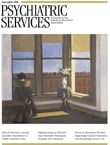Outpatient Psychiatry: A Beginner's Guide
Thomas Steele has been training psychiatry residents in an outpatient setting for over 25 years at the Medical University of South Carolina. He states that he has long wished for a single text addressing the needs of the neophyte outpatient psychiatrist, and thus he has written Outpatient Psychiatry: A Beginner's Guide . The book provides an overview of several topics in outpatient psychiatry, including psychodynamic psychotherapy, cognitive-behavioral therapy (CBT), brief psychotherapy, supportive psychotherapy, psychotherapy with the prescription of psychotropic medication, psychotherapy research, and issues common to various therapies.
Given the topics covered, A Beginners Guide to Psychotherapy might have been a more accurate subtitle. At 169 pages, the author does not attempt to cover each topic in depth but introduces the most salient points for a novice therapist. Steele understands that most psychiatry residents are initially somewhat uncomfortable with psychotherapy, and therefore he writes the book from a reassuring and hopeful perspective. Both eloquent and humorous, Steele makes the usually dense topic of psychotherapy relatively accessible.
As a third-year resident I found that the book consolidated my knowledge about psychotherapy and provided some pearls of wisdom that I had not come across in previous reading. Steele is at his best when he draws on his experience to distill information into a form that is useful and practical for residents. He is less effective when he attempts to summarize large quantities of information, thereby making material so diluted as to be of little utility. Fortunately, the majority of the book is written from the former perspective.
Steele's least useful chapter summarizes CBT; he becomes lost in the details of CBT techniques that cannot be adequately described in the pages allotted. In contrast, the chapter on psychodynamic therapy is excellent. In particular, Steele's summary of Strupp's psychotherapeutic lessons provides a useful framework for a resident who may initially need a relatively concrete set of goals for the psychotherapy patient. The chapter about psychotherapy research provides a lens that is particularly useful for the beginner psychiatrist. Steele begins with a succinct history of psychotherapy research and describes some of the unique challenges of psychotherapy studies.
Steele also provides a useful review of basic clinical statistics. Given that the psychiatric literature is replete with large placebo effects, Steele explains that these placebo rates do not demonstrate the psychiatric benefits of sugar pills. Instead the placebo effects likely reflect "regular contact with a concerned professional who takes an interest in the patient's symptoms, side effects, and progress," a placebo effect that is inherent in clinical trials and particularly germane to psychiatric studies. Steele also distinguishes between what Gabbard calls efficacy and effectiveness in psychiatric research. Efficacy reflects research on highly selected, well-defined patient populations. However, efficacy may bear little resemblance to the effectiveness demonstrated in studies of treatment of patients with multiple diagnoses in common clinical practice. Overall, Outpatient Psychiatry is a worthwhile text for beginning psychiatrists hoping for a practical and insightful overview of selected psychotherapeutic techniques and psychiatric paradigms.



